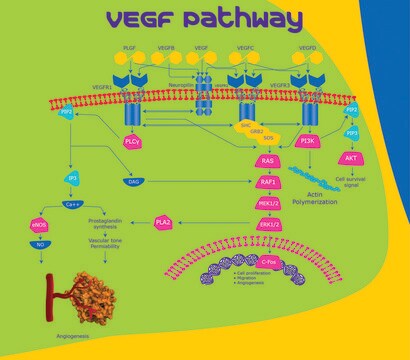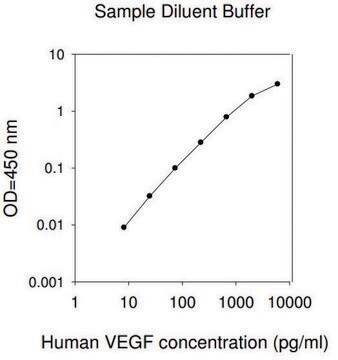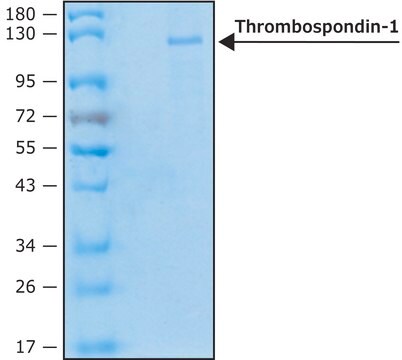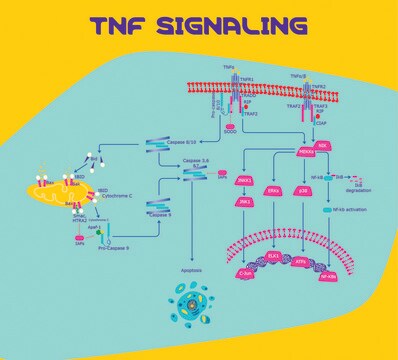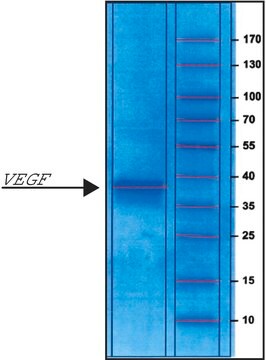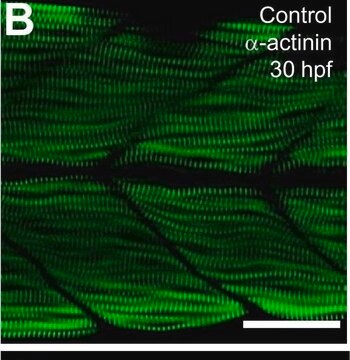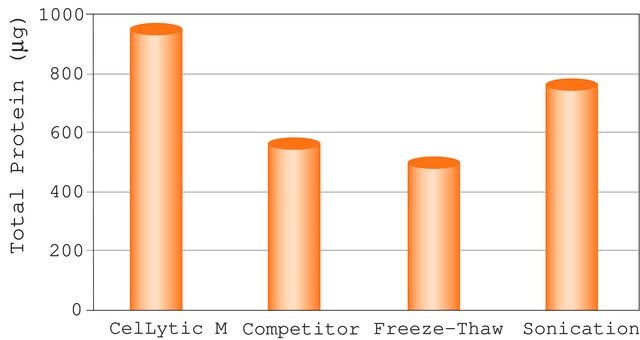SRP3184
VEGF-C human
recombinant, expressed in HEK 293 cells, ≥95% (SDS-PAGE), ≥95% (HPLC), suitable for cell culture
Synonyme(s) :
VRP, Vascular Endothelial Growth Factor-C, flt4 ligand
Se connecterpour consulter vos tarifs contractuels et ceux de votre entreprise/organisme
About This Item
Code UNSPSC :
12352202
Nomenclature NACRES :
NA.32
Produits recommandés
Source biologique
human
Produit recombinant
expressed in HEK 293 cells
Essai
≥95% (HPLC)
≥95% (SDS-PAGE)
Forme
lyophilized
Poids mol.
30.0-33.0 kDa
Conditionnement
pkg of 20 μg
Technique(s)
cell culture | mammalian: suitable
Impuretés
<0.1 EU/μg endotoxin, tested
Couleur
white
Numéro d'accès UniProt
Conditions d'expédition
wet ice
Température de stockage
−20°C
Informations sur le gène
human ... VEGFC(7424)
Description générale
Vascular endothelial growth factor-C (VEGF-C) is a member of the VEGF/PDGF family of structurally related proteins, is a potent angiogenic cytokine. It promotes endothelial cell growth, promotes lymphangiogesis, and can also affect vascular permeability. It forms cell surface-associated non-covalent disulfide linked homodimers, and can bind and activate both VEGFR-2 (flk1) and VEGFR-3 (flt4) receptors. During embryogenesis, VEGF-C may play a role in the formation of the venous and lymphatic vascular systems. Both VEGF-C and VEGF-D are over-expressed in certain cancers, and the resulting elevated levels of VEGF-C or VEGF-D tend to correlate with increased lymphatic metastasis. VEGF-C is expressed in various tissues, but is not produced in peripheral blood lymphocytes. Recombinant human VEGF-C is a 13.5kDa disulfide linked homodimeric protein consisting of two 116 amino acid polypeptide chains. Due to glycosylation the protein migrates as a 30.0-33.0 kDa band by SDS-PAGE analysis under non-reducing condition.
Actions biochimiques/physiologiques
Vascular endothelial growth factor-C (VEGF-C) is a potent angiogenic factor. It promotes endothelial cell growth, lymphangiogesis and can also affect vascular permeability. VEGF-C can bind and activate both vascular endothelial growth factor receptors-2 and -3 (also known as flk1 and flt4 respectively). During embryogenesis, the protein may play a role in the formation of the venous and lymphatic vascular systems. Both VEGF-C and VEGF-D are over-expressed in certain cancers, and the resulting elevated levels of VEGF-C or VEGF-D tend to correlate with increased lymphatic metastasis.
Séquence
AHYNTEILKS IDNEWRKTQC MPREVCIDVG KEFGVATNTF FKPPCVSVYR CGGCCNSEGL QCMNTSTSYL SKTLFEITVP LSQGPKPVTI SFANHTSCRC MSKLDVYRQV HSIIRR
Forme physique
Lyophilized with no additives.
Reconstitution
Centrifuge the vial prior to opening. Reconstitute in water to a concentration of 0.1-1.0 mg/ml. Do not vortex. This solution can be stored at 2-8°C for up to 1 week. For extended storage, it is recommended to further dilute in a buffer containing a carrier protein (example 0.1% BSA) and store in working aliquots at -20°C to -80°C. Avoid repeated freeze-thaw cycles.
Code de la classe de stockage
11 - Combustible Solids
Classe de danger pour l'eau (WGK)
WGK 3
Point d'éclair (°F)
Not applicable
Point d'éclair (°C)
Not applicable
Faites votre choix parmi les versions les plus récentes :
Déjà en possession de ce produit ?
Retrouvez la documentation relative aux produits que vous avez récemment achetés dans la Bibliothèque de documents.
Himadri Roy et al.
FEBS letters, 580(12), 2879-2887 (2006-04-25)
Angiogenesis is the process by which new blood vessels are formed from existing vessels. The vascular endothelial growth factors (VEGFs) are considered as key molecules in the process of angiogenesis. The VEGF family currently includes VEGF-A, -B, -C, -D, -E
Ellen C Breen
Journal of cellular biochemistry, 102(6), 1358-1367 (2007-11-06)
Vascular endothelial growth factor A (VEGF-A) belongs to a family of heparin binding growth factors that include VEGF-B, VEGF-C, VEGF-D, and placental-like growth factor (PLGF). First discovered for its ability to regulate vascular endothelial cell permeability, VEGF is a well-known
Vascular permeability factor/vascular endothelial growth factor induces lymphangiogenesis as well as angiogenesis.
Nagy JA
The Journal of Experimental Medicine, 196(11), 1497-1506 (2002)
Vascular endothelial growth factor-C (VEGF-C) and its receptors KDR and flt-4 are expressed in AIDS-associated Kaposi's sarcoma.
Skobe M
The Journal of Investigative Dermatology, 113(6), 1047-1053 (1999)
Vascular endothelial growth factor (VEGF)-A165-induced prostacyclin synthesis requires the activation of VEGF receptor-1 and -2 heterodimer.
Neagoe PE
The Journal of Biological Chemistry, 280(11), 9904-9912 (2005)
Notre équipe de scientifiques dispose d'une expérience dans tous les secteurs de la recherche, notamment en sciences de la vie, science des matériaux, synthèse chimique, chromatographie, analyse et dans de nombreux autres domaines..
Contacter notre Service technique